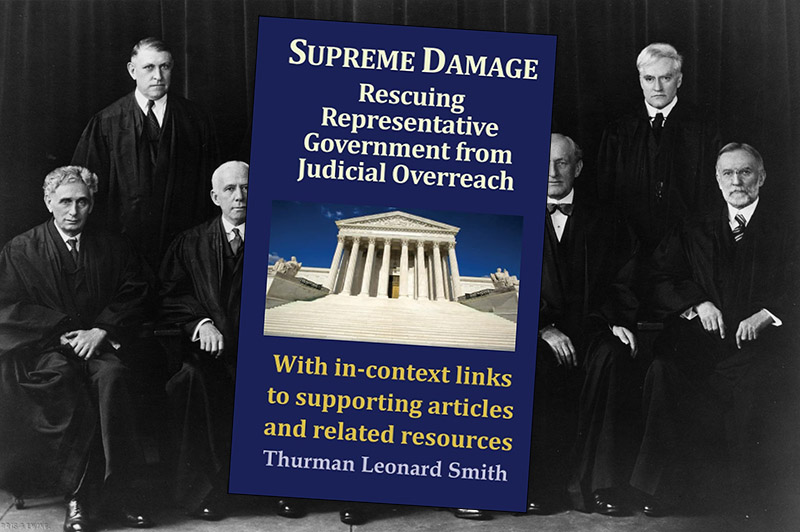meet our $100,000 MATCHING Challenge!
How flawed US Supreme Court rulings over the years damaged our country: Explained in a powerful book by a MassResistance supporter.
Book documents the shocking distortions of our constitution over the past 130 years.
Obergefell is just one of the latest of a long line!
February 23, 2025
 This book should be in every constitutional activist's library. Background: the Supreme Court members during the New Deal (1937).
This book should be in every constitutional activist's library. Background: the Supreme Court members during the New Deal (1937).We’re all familiar with the deeply flawed Roe v Wade (abortion) and Obergefell (same-sex “marriage”) rulings by the US Supreme Court. Both have had destructive effects on America.
The Roe decision was recently revisited by the Court and overturned. And as we’ve recently reported, several state legislatures are in the process of passing MassResistance resolutions urging the Court to revisit the Obergefell ruling.
In fact, over the past 130 years there have been numerous flawed Supreme Court rulings that distorted the clear meaning of the Constitution – and have greatly harmed society. Most of us are barely aware of these rulings – while their ill effects continue.
Now you can learn about them in an important book now available.
Here is the alarming truth about too many Supreme Court cases over the years: They have abused precedent, contorted text, imported foreign law, nullified rights, played favorites, and played legislator. Many are products of the idea of a “living constitution” (that must be re-interpreted as society evolves). Bad rulings sometimes involved judicial dishonesty or judicial imperialism.
Thurman Smith lives in Massachusetts and has been a friend of MassResistance for over twenty years. He has written a powerful and well-researched book, Supreme Damage, that describes these problematic rulings. He accomplishes this in only 210 pages, wonderfully understandable by the average reader.
This review of 17 badly-decided cases that are still affecting us demonstrates how the Court assumed powers not envisioned by the Founders, in turn diminishing the role of representative government, the federal structure, and individual liberty. This book should be in every serious constitutional activist’s library.
Here are the cases Smith reviews:
United States v. Won Kim Ark (1898)
Changed the meaning and purpose of the citizenship clause of the Fourteenth Amendment to rule that when citizens of other countries give birth in the US, their children are US citizens.
Plyler v. Doe (1982)
Retrofitted the equal protection clause of the Fourteenth Amendment to rule that children in the country illegally (i.e., illegal aliens) are entitled to enroll in public schools.
Steward Machine Company v. Davis (1937)
Allowed the federal government to bypass the Tenth Amendment and tax businesses to provide New Deal benefits.
Helvering v. Davis (1937)
As part of the New Deal, re-interpreted the “general welfare” clause to allow the federal government to further bypass the Tenth Amendment to allow welfare payments to individuals and politically-motivated spending for local and state projects.
West Coast Hotel v. Parrish (1937)
Ruled that states can create minimum wage laws, which quickly led to further laws essentially micro-managing how businesses operate.
United States v. Carolene Products Company (1938)
Allowed laws that would appear to violate due process and equal protection, if they have a “rational basis” for their purpose.
Wickard v. Filburn (1942)
Infinitely expanded the interstate commerce clause to allow federal control of goods that never leave a state. (Also became a basis for allowing Obamacare.)
Everson v. Board of Education (1947)
Expanded the meaning of the First Amendment to repress religious expression in the public sphere. Formalized the term "wall of separation."
Berman v. Parker (1954)
Allowed the government to use eminent domain to take and transfer private property to private real estate developers if it would generally benefit the area.
Kelo v. New London (2005)
Further expanded eminent domain confiscation of property given to private developers if the result would be increased tax revenues for the local government.
Bennis v. Michigan (1996)
Formalized civil asset forfeiture – the government confiscating property without charging a person with a crime, or any due process. (This is even used now in airports – confiscating large amounts of cash from travelers.)
Roe v. Wade (1973)
Created a constitutional “right” to abortion. (Overturned by the Dobbs ruling in 2022.)
Chevron U.S.A. v. Natural Resources Defense Council (1984)
A federal agency’s interpretation of an ambiguous law is considered to be the permissible and legal interpretation. (Overturned by Loper Bright Enterprises v. Raimondo in 2024.)
Auer v. Robbins (1997)
A federal agency can legally interpret its own ambiguous regulations on the fly, rather than have courts decide these independently.
Lawrence v. Texas (2003)
Ruled that anti-sodomy laws are an unconstitutional “violation of privacy.” This decision was cited as precedent in Goodridge v. Massachusetts Dept. of Public Health (Massachusetts “gay marriage” ruling, 2003) and ultimately to the Obergefell case.
Obergefell v. Hodges (2015)
Ruled that banning same-sex marriage is unconstitutional.
National Federation of Independent Business v. Sebelius (2012)
Ruled that Obamacare constitutes “tax” and is therefore constitutional. (This reasoning was invented by Chief Justice Roberts. Even Obama himself never claimed it was a tax.)
You can buy the book on Amazon HERE for $9.99 paperback or $4.95 Kindle edition.
Final thoughts
In our Founders’ vision, the courts were meant to decide individual disputes between parties, or between a party and the government.
But the book Supreme Damage concludes: “The gravest error by the drafters of the Constitution may have been in not foreseeing that the Judiciary would slowly gain powers over the legislative and executive branches, as well as over powers properly belonging to the states. The Judiciary was never meant to be an all-powerful institution in which a handful of unelected lawyers in black robes have the final say over major public policy issues.”
Please help us continue to do our uncompromising work!
Our successes depend on people like you.
Your support will make the difference!
